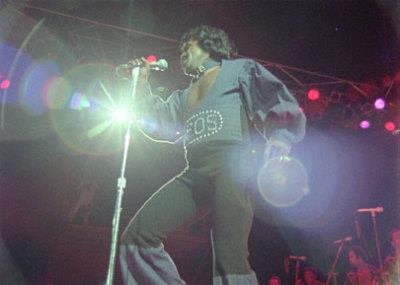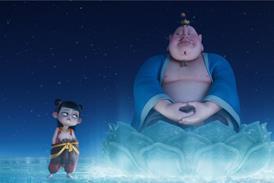
Dir. Jeffrey Levy-Hinte. US. 2008. 93 mins.
Jeffrey Levy-Hinte became obsessed with outtakes from Leon Gast’sWhen We Were Kings(1995) when he was editing it. The documentary about the famed ‘Rumble in the Jungle’ boxing match in which Muhammed Ali upset George Foreman 34 years ago in what was then known as Zaire (now Congo) went on to win an Oscar. But Levy-Hinte went on to assemble the unused footage of the music concert that preceded the fight in Kinshasa by six weeks-a mostly noble attempt at the tail end of the Black Power era to bring African-American and African musicians together-as well as the musings of its participants and the sometimes dubious backstage arrangements that made this dauntless task possible.
The director integrates these sequences successfully, his fluid montage a brilliant echo of the assorted rhythms recorded onstage and behind the scenes by several 16-mm cameras. He does not allow us to the luxury of becoming totally lost in the artifice of stagecraft, rather grounding us by inserting casual scenes of local villagers going about their daily tasks. A unique moment in time is now on record, an invaluable time capsule, thanks to an excellent transfer to HD, and the film should get sufficient theatrical play before commencing a long shelf life as a cult item. Celluloid Dreams picked up international rights at Toronto and a domestic deal is pending.
Levy-Hinte opens with the phenomenal James Brown performing, and after half an hour of conversations between promoters (Stewart Levine, Hugh Masakela), the normally unsung techies, and an out-of-place British suit who reps Liberian investors, the first of three concerts begins.
The Spinners do their Temptations-like song-and-dance numbers. Flamboyant Celia Cruz and her Fania All-Stars add a Latin twist to their act. The more reserved BB King (‘The Thrill is Gone’) and Bill Withers (‘Hope She’ll Be Happier’) are sensational with ballads and hot back-ups. Zairian performers are mostly in animal and other indigenous costumes, tied more than their U.S.-reared counterparts to historically uninterrupted rituals. The real knockout is the gorgeous South African Miriam Makeba, then married to Stokely Carmichael of the Black Panthers, whose corn rows sweep up into a fabulously baroque comb as she does a fantastic rendition of ‘what the colonialists in South Africa call The Click Song.’
The film ends again with Brown, not just with a superb rendition of ‘Say It Loud (I’mBlack and I’m Proud)’ before an adoring Zairian audience, but withscenes of the gregarious genius relaxing in his dressing room. HereBrown tells African-Americans in direct address, ‘When you walk downthe street, you tell yourself, ‘Damn right, I’m somebody!’ ’ Earlier,the ever-modest Muhammed Ali, who appears frequently throughout thefilm, had commented to some of the musicians, ‘I’m the world’s greatestfighter. I don’t want to be another Negro.’ One of the greatest singersand the finest athlete of that era express the zeitgeist, at least inthe sphere of race. (Unfortunately, most of the participants were naïveabout the excesses and CIA backing of the corrupt Zairian dictator,Mobutu Sese Soko).
Production company
Antidote Films, Inc.
US distribution
c/o Submarine
International sales
Celluloid Dreams (+331-4970-0370)
Producer
Jeffrey Levy-Hinte
David Sonenberg
Leon Gast
Cinematography
Paul Goldsmith
Kevin Keating
Albert Maysles
Roderick Young
Editor
David Smith






















No comments yet